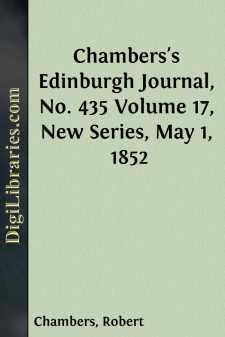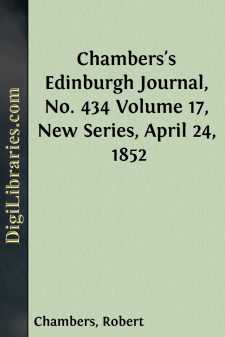Categories
- Antiques & Collectibles 13
- Architecture 36
- Art 48
- Bibles 22
- Biography & Autobiography 813
- Body, Mind & Spirit 142
- Business & Economics 28
- Children's Books 17
- Children's Fiction 14
- Computers 4
- Cooking 94
- Crafts & Hobbies 4
- Drama 346
- Education 46
- Family & Relationships 57
- Fiction 11829
- Games 19
- Gardening 17
- Health & Fitness 34
- History 1377
- House & Home 1
- Humor 147
- Juvenile Fiction 1873
- Juvenile Nonfiction 202
- Language Arts & Disciplines 88
- Law 16
- Literary Collections 686
- Literary Criticism 179
- Mathematics 13
- Medical 41
- Music 40
- Nature 179
- Non-Classifiable 1768
- Performing Arts 7
- Periodicals 1453
- Philosophy 64
- Photography 2
- Poetry 896
- Political Science 203
- Psychology 42
- Reference 154
- Religion 513
- Science 126
- Self-Help 84
- Social Science 81
- Sports & Recreation 34
- Study Aids 3
- Technology & Engineering 59
- Transportation 23
- Travel 463
- True Crime 29
Chambers's Edinburgh Journal, No. 455 Volume 18, New Series, September 18, 1852
by: Robert Chambers
Description:
Excerpt
A GLANCE AT CONTINENTAL RAILWAYS.
When lately making a pretty extensive continental excursion, we were in no small degree gratified with the progress made in the construction and operation of railways. These railways, from all that could be seen, were doing much to improve the countries traversed, and extend a knowledge of English comforts; for it must always be borne in mind that the railway system, with its locomotives, carriages, waiting-rooms, commodious and cheap transit, and other matters, is essentially English. Hence, wherever one sees a railway in full operation, he may be said to see a bit of England. And is not this something to be proud of? The railway being your true civiliser, England may be said to have sent out a missionary of improvement, whom nothing can withstand. The continent, with all its stupid despotisms, must improve, and become enlightened in spite of itself.
The newspapers lately described the opening of the line of railway from Paris to Strasbourg. Those who know what travelling in France was a few years ago, cannot wonder that Louis Napoleon should have made this the occasion of a popular demonstration. The opening of this line of railway is an important European event; certainly it is a great thing for both France and Germany. English travellers may also think much of it. A tourist can now journey from London to Paris—Paris to the upper part of the Rhine at Strasbourg, going through a most interesting country by the way—then go down the Rhine to Cologne by steamer; next, on by railway to Ostend; cross by steamer to Dover; and, finally, reach London—thus doing in a few days, and all by force of steam, what a short time ago must have been done imperfectly, and with great toil and expense. Still more to ease the journey, a branch railway from the Strasbourg line is about being opened from near Metz, by Saarbrück, to Manheim; by which means the Rhine will be reached by a shorter cut, and be considerably more accessible. In a month or two, it will be possible to travel from Paris to Frankfort in twenty-five hours. All that is wanted to complete the Strasbourg line, is to strike off a branch from Metz to Luxembourg and Treves; for by reaching this last-mentioned city—a curious, ancient place, which we had the pleasure of visiting—the traveller is on the Moselle at the spot where it becomes navigable, and he descends with ease by steamer to Coblenz. And so the Rhine would be reached from Paris at three important points.
Paris, as a centre, is pushing out other lines, with intermediate branches. Marseille, Bordeaux, Nantes, Rouen, Dieppe, Boulogne, Calais, and Lille, are the outposts of this series of radiation. The latest move is a line from Caen to Cherbourg; it will start from the Paris and Rouen Railway at Rosny, 40 miles from Paris, and proceed through Caen to the great naval station at Cherbourg—a distance of 191 miles from Rosny. By the time the great lines in France are finished—probably 3500 miles in the whole—it is expected that the total expenditure will amount, in round numbers, to a hundred millions sterling....












